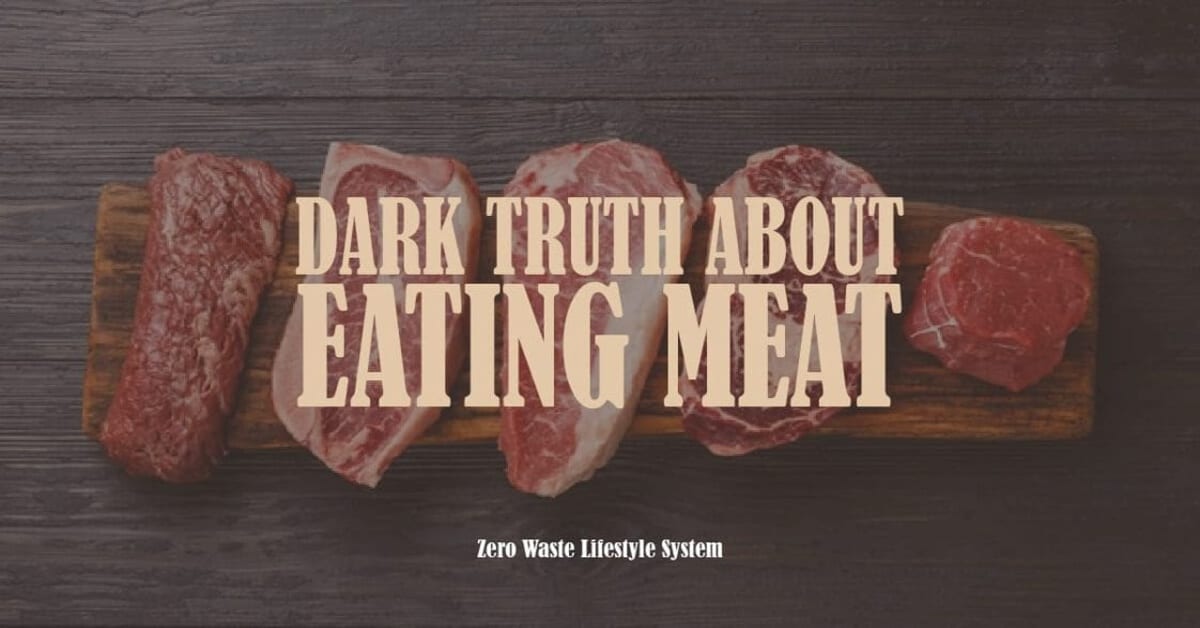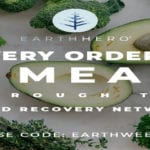Eating meat is such an integral part of human diets. Since our ancestors hunted animals for food, we have been hooked into a love affair with meats. Countries all over the world include different types of meats to cook culturally rich and flavorful cuisines.

Fast food and restaurant chains have even created their business around mouth-watering, crunchy, crispy meat dishes. Think steaks, fried chicken, curries, chili con carne. Hmm. Yum! Just the sound of these dishes can make an average person drool.
But everything is not sunshine and daisies with eating meat. Beneath the juicy, crunchy, finger-licking goodness of many meaty dishes lurks dark truths.
I asked food industry experts, food bloggers, doctors and other experts about the grim implications of eating meat. Learn from their insights and get inspired to shift to a less meaty or meatless diet.
Why should one shift to a meatless diet?
Firstly, a meatless diet is a great way to go sustainable.
According to Erin Stone of Hinterland Co, The Intergovernmental Panel on Climate Change (IPCC) itself released a report last year that recommends for a significant reduction of meat consumption to successfully curb our greenhouse gas emissions substantially enough to avoid catastrophic levels of climate change.
Jennifer Molidor, senior food campaigner at Center for Biological Diversity, said that plant-based diets have been shown to be better for the planet, better for people, and better for animals. By changing our diets, we can increase demand for healthier, more sustainable food. And on a personal level, shifting to a plant-based diet reduces our carbon footprints more than recycling, turning off lights or changing our commute.
Dr. Lina Velikova of Supplements101 says that you can significantly reduce your carbon footprint by replacing red meat with plant-based alternatives. Just to put it in perspective, a kilo of red meat takes about 27 kilos of C02 to produce. So if you multiply this number all over the world, it’s an incredible quantity of carbon emissions produced simply by the sheer numbers of cows on the planet.
Aside from being able to care for the environment more, eating meat less offers several health benefits.
Nutritionist Lisa Richards, author of The Candida Diet, said that switching to a meatless diet can significantly reduce saturated and *trans* fat from one’s diet. It has been proven to have significant health benefits when followed carefully, being sure to integrate essential nutrients like B12, iron, and complete protein.
According to Rafid Nassir, Senior Coach at Vegan Liftz, there are no inherent benefits that one gets from a carnivore diet over other diets. Meat eaters might try to tell you that you can’t get enough protein from a vegetarian or a vegan diet but that’s simply not true. A meatless diet reduces the risk of several diseases like obesity, high B.P. and certain types of cancer including colon, breast, stomach, and lung. If not for the animals, you should do it for your health.
Health aside, humanity is capable of extreme compassion, which people tend to suppress when eating animals. Dr. Patricia Celan says, “Society taught you to suppress your compassion; reconnect with it and reflect on the suffering of living beings in the animal agriculture industry.”
What dangers are there in eating meat?
The dangers from eating meat comes from four things: overeating, infections, hormone-filled produce, and mishandled meat products.
In terms of health, moderate red meat consumption isn’t dangerous, but overeating it certainly is. Red meat contains high levels of LDL cholesterol, that can result in clogged arteries as we get older. Ideally, red meat should be avoided or eaten no more than a couple of times per week.
Eating meat is risky in terms of getting infected from ill animals or mishandled meats. According to the CDC, 75% of new infectious diseases come from animals. Dr. Patricia Celan says, “This can be from contacting the environment the animals are in or consuming food/water contaminated by the animal.”
Livestock production is also a risk factor for pandemics due to increased pressure on wildlife caused by habitat loss and crowded, unsanitary conditions at factory farms.
According to Dr. Gilson of Expert Insurance Reviews, meat is often chockfull of hormones and other additives that lead to higher fat retention and other health issues in humans who consume those animals. High fat meats can have negative health consequences for those at higher risk for heart disease, stroke, and some forms of cancer.
And of course, improperly handled meat, such as meat that is not cooked to a high enough temperature or is stored at high temperatures, can cause food poisoning and other serious health issues.
Even when you think you cook meat well, you are still not fully safe. According to Dr. Trista Best of Balance One Supplements, when meat is smoked or grilled, it can create compounds known as carcinogens. Carcinogens are known cancer-producing agents. Along those same lines heme-iron, the type of iron in animal products, may produce compounds that can damage cells which can lead to chronic conditions.
What environmental impacts does the meat industry have?
More than health risks, eating meat has many negative impacts upon our environment.
Meat is a major problem for our planet. It is an industry that takes a huge toll in the environment from production to food processing.
The meat industry, especially the ones that employ intensive cattle-farming operations, make up 50% of all man-made greenhouse gases on our planet. This is not including the toxic runoffs that pollute water nearby rivers and streams, ending up in our lakes and oceans. Then there is the deforestation to account for, since intensive cattle farming takes up large amounts of land, damaging nearby ecosystems in their wake.
Using Too Much Resources
Animal agriculture takes up too many land and water resources to sustain the ever-increasing human population. According to Bill Broadbent of Edible Insects, one pound of beef requires over 1500 gallons of water. One cow needs more than an acre of land.
Supplying land and water for meat production has created serious problems for our planet, for the livestock we raise and for us as a species. We’re destroying our own ecosystem to accommodate an ever expanding consumer market for meat.
Livestock animals raised for meat require massive amounts of land, feed, and water. The same amount of resources input for meat could produce plant-based food many times over.
The amount of water required for animal rearing is insane. It takes more than 2400 gallons of water to produce a pound of beef. Compare that to the amount of water it takes to produce a pound of tofu – 244 gallons.
Animal Cruelty
According to Natasha and Ed Tatton of *BR*e*D*, a vegan bakery cafe, the way animals are bred and raised is unnatural and downright cruel: no sunlight or room to move; babies taken and killed immediately; animals beaten; not to mention the majority of antibiotics that are pumped into these creatures so they can live just long enough for us to slit their throats, which in turn is making us resistant to antibiotics too.

Cameron Pullano of Plantx says that the large majority of industrial meat production is sourced from farms and factories that treat the animals like any other product or raw material, with no regard to their well-being or mental state. These animals live in small spaces for their entire lives and have little chance to enjoy anything.
Pollution

The meat industry is also responsible for a ton of pollution according to the US Environmental Protection Agency. Animal waste is stored in lagoons or sprayed over fields. The runoff ends up in our water bodies, contaminating it.
The production of beef alone contributes 337 billion pounds of greenhouse gases and produces 489 billion pounds of toxic manure just in the United States.
Needless Murder of Wildlife
Not only are farmed or mass produced animals killed for the love of eating meat, but many wild animals are also affected fatally in the process.

Many species of wild animals, birds and insects have gone extinct due to rainforests being destroyed to make way for cattle.
Commercial fishing destroys our ocean life. Trawling and long-lining have killed thousands of dolphins, sea turtles, and sharks.
How can an avid meat eater successfully shift to a meatless diet?
Eating meat is such an integral part of human diets. So just thinking of a meatless diet is not enough. You need to plan and take things slowly. To successfully shift to a meatless diet, here are some expert tips.
Go meatless slowly.
Jenni Fielding of Choose Veganism recommends adding in meatless Mondays or one vegan meal per day, This gives you the chance to learn how to cook healthy meat-free food and find alternatives to your favourite meat products.
Create A Gradient Transition:
Cory Varga, chef at Yuzu Bakes, and her husband used to be avid meat eaters first transitioned to a lot of similar tasting products, like vegan salamis, vegan steaks, before discovering the joys of wholefoods.
Take Advantage of plant-based meats:
Avid meat-eaters can make a much easier transition to a meatless diet nowadays thanks to plant-based meat alternatives such as the Impossible Burger. In 2020, there are many companies producing vegan cheese that melts, soya chicken wings and vegan junk food. So switching to a meatless diet doesn’t mean you’re doomed to eat beans and tofu forever, as there are many popular foods that are available in plant-based form nowadays.
Find a community of vegans or vegetarians

Dr. Patricia Celan suggests, “Seek out a vegan/vegetarian community, such as a Facebook group in your area, and ask for suggestions and support in your goal. Sign up for veganism transition support programs such as Veganuary.com or Challenge22.com.”
Meal plan with eating meat less.
Anju Mobin of BestofNutrition recommends, “Pay attention to vegetarian food you like and incorporate them in your meal plans. Explore more vegetarian recipes and various global cuisines. Experiment with soy-based foods such as tofu and tempeh. Try marinating, sauteing, baking and even grilling.”
Mark Snyder of Weird For Beauty advises the need for “hearty proteins into your diet as you start to reduce your meat intake, such as peanut butter, beans, and the plethora of faux meats available these days.”
When making a switch to a plant-based diet, it is also important to consider your calcium, iron, and essential fatty acid intake as these are commonly found in foods derived from animal sources. Calcium can be found in green leafy vegetables like swiss chard, spinach, turnip greens and kale. Plant-based iron foods can also be found in leafy greens, legumes, and fortified cereals. However, non-heme iron from plants is not as easily absorbed as heme-iron and should be coupled with vitamin C rich foods to help with it’s absorption into the body.
Most importantly, learn to love home cooking more. With this, you can track what you eat better – taking care of your body and and saving money in the process. A win-win situation!
Don’t worry about making mistakes.
Don’t worry if you slip up and eat the occasional dairy product or egg. The ‘all or nothing’ approach is unrealistic: nobody is perfect! Look for vegan options in restaurants and try plant-based meats out as a substitute in your normal recipes to help with any cravings you get. Over time, you may find a ‘new normal’ and not want to eat faux meat but may prefer beans, pulses, seeds and nuts.
Conclusion
Eating meat less is one of the best ways you can practice a sustainable lifestyle. Not only will you avoid risks of infected or carcinogenic meat products, you can also take advantage of the rejuvenation from a more plant-based diet. Most importantly, you can also significantly reduce your carbon footprint by refusing to buy into one of the most environmentally destructive industries.
Yet I myself admit that eating meat less can be a struggle. You don’t have to try – nor should you – try to be a vegetarian overnight. Rather, take small, sure steps that will take you from a voracious meat eater to a conscious-minded veggie lover. Take advantage of plant-based meats or protein-rich vegetables. Or do a meatless day to limit your intake but still make the transition fun.
Love yourself and Mother Earth more by eating meat less. Choose a diet that is money-saving and healthy at the same time. And don’t forget to avoid food waste by composting any food scraps.





4 Comments
Leave a Reply4 Pings & Trackbacks
Pingback:Zero Waste Hacks To A Fun Summer
Pingback:Fast Food And Its Dark, Unsavory Truths - Zero Waste Lifestyle System
Pingback:Raising A Child The Vegan Way: An Interview With 8 Miles From Home - Zero Waste Lifestyle System
Pingback:Beef: The True Cost - Zero Waste Lifestyle System